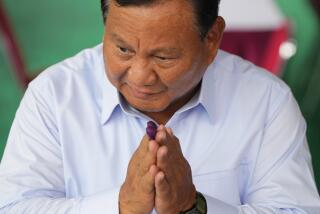Indonesia Vote Marks Retreat of Military, Islam
- Share via
JAKARTA, Indonesia — This week’s largely symbolic election has reaffirmed the ruling party’s unassailable grip on political life here, but the campaigning revealed a surprisingly strong undercurrent of dissatisfaction among young, urban Indonesians who appeared to be voting for change.
The election Thursday also appeared to mark three turning points in the country’s political development: the retreat of the military from its active support of the government to a more neutral stand, the decline of Islam as a political force, and perhaps most significantly, the most orderly and violence-free election since independence.
The voting itself was for 400 seats in a virtually powerless Parliament, with real power firmly in the hands of President Suharto and a tightknit military-bureaucratic Establishment. But elections--derided by many as a farce--nonetheless have come to be seen as the only gauge of political sentiment in a country with limited outlets for free expression.
Initial, unofficial returns showed that Golkar, the government’s political organization, would get at least 70% of the vote, the figure the party’s officials had confidently predicted. Through its control of the bureaucracy and affiliated groups involving women, labor and youth, Golkar’s influence stretches into every village, so a landslide victory was never really in doubt.
Small Party Gains
More significant to analysts was the strong voter support for the small Indonesian Democratic Party, which appeared to have won about 12%, better than its 1982 showing of 8%. The party now seems poised to challenge the Muslim-based United Development Party to become the second-strongest force in Indonesian politics.
The United Development Party, which won 28% of the vote five years ago, has been plagued by internal squabbling and the withdrawal of one of the country’s two influential Muslim organizations from its coalition. Islam in the past provided an emotional election rallying cry in this 90%-Muslim country, and the party’s decline this year appeared to reflect the government’s success in defusing the potentially explosive issue.
Results Friday showed the United Development Party winning only about 16% of the vote.
But actual results under Indonesia’s tightly controlled elections are always less important than the sentiments unleashed during the campaigning period.
This year, the campaigning revealed an unexpected undercurrent of discontent among young Indonesians in the large cities, reflecting in part a generational changeover.
Sarwono Kusumaatmadja, the youthful secretary general of Golkar, said before the voting that the surprising and spontaneous support for the Indonesian Democratic Party during its rallies showed that many young people favor a loosening of the present system to bring in fresh leadership and allow for greater democratic freedoms.
More to Read
Sign up for Essential California
The most important California stories and recommendations in your inbox every morning.
You may occasionally receive promotional content from the Los Angeles Times.









